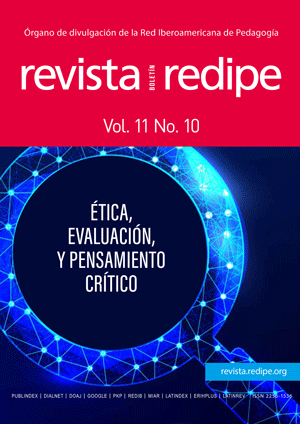Critical thinking, science, and creativity a strong trinomial.
Main Article Content
Keywords
Critical thinking, science disclossure, Creativity, Co-curricular, Basic education, Educational innovation technology
Abstract
The aim of this article is to prove that a cocurricular program of scientific disclosure and arts mediated by informational technology can promote the development of critical thinking on 4th grade students. This is a qualitative research that through participative observation and semi structured interviews gathers information. Among the main results arouses the fact that the design of a co-curricular program of science disclosure and art may promote the development of critical thinking abilities, when generating working conditions. In a suitable ambience kids feel confident to participate, asking questions, share their point of view, and collaborate with others through experiments, observation and considerations about a topic.
References
Anello, F. (2019). Teaching activity and evaluation of Critical Thinking in primary school. Iceri2019. Proceedings. 1380-89.
Castell, N., & et.al. (2021). Implementing citizen science in primary schools: Engaging young children in monitoring air pollution. Frontiers in Climate, 3, 1-8 DOI: 10.3389/fclim.2021.639128.
Costa, S. L. R., et.al. (2020). Critical thinking in science education and Mathematics education: research trends of 2010-2019. Research, Society and Development, 9(9), e115996706. https:// doi.org/10.33448/rsd-v9i9.6706
Ennis, R., & Weir, E. (1985). The Ennis-Weir Critical Thinking Essay Test. Pacific Grove, CA.: Midwest Publications.
Gotoh, Y. (2017). Development of critical thinking with metacognitive regulation and Toulmin model. In Sampson, D. G., Spector, J. M., Ifenthaler, D., Isaías, P., & International Association for Development of the Information Society (IADIS). (2017). Proceedings of the International Association for Development of the Information Society (IADIS) International Conference on Cognition and Exploratory Learning in Digital Age (14th, Vilamoura, Algarve, Portugal, October 18-20, 2017). International Association for Development of the Information Society.
Jiménez-González, M. (2016). Relación entre difusión de transgénicos y clonación y la vida cotidiana de jóvenes. En S. &.- M. Herrera-Lima, De la academia al espacio público. Comunicar ciencia en México (págs. 177-196). Guadalajara, Jalisco: ITESO.
Lamb, R., et.al., (2019). A computational model of student cognitive processes while solving a critical thinking problem in science. Journal of Educational Research, 112 (2), 243–254 DOI: https://doi.org/10.1080/00220671.2018. 1514357.
Morin, E. (2020). Festival de Incertidumbres. Tracts de crise 54, https://tracts. gallimard.fr/fr/products/tracts-decrise-n54-un-festival-d-incertitudes.
Nomen Recio, J. (2019). La escuela, ¿un receptáculo del pensamiento crítico? Folia Humanística. 11, 29-43.
Núñez-Lira, L. A., et.al. (2020). Estrategias didácticas en el desarrollo del pensamiento crítico en estudiantes de educación básica. Revista eleuthera, 22(2), 31-50. https://doi.org/10.17151/ eleu.2020.22.2.3.
Olarte García, J. (2020). Homogeneizar la práctica de la modelación: un reto del sistema educativo colombiano. Revista Educación, 44 (1), 1-14.
Romo Paredes, M. (2018). Investigación las Rutas Cuantitativa, Cualitativa y MIxta. México: MacGrawHill.
Sanchez Torres, A. (2018). A propósito de los siete saberes de Edgar Morin. Anales de la Fundación Canis Majoris, 412.
Tamayo A., O. E., et.al. (2015). El pensamiento crítico en la educación. Algunas categorías centrales en su estudio. Revista Latinoamericana de Estudios Educativos (Colombia), 11(2), 111-133.
Tamayo-Alzate, O. E., et.al. (2019). Análisis metacognitivo en estudiantes de básica, durante la resolución de dos situaciones experimentales en la clase de Ciencias Naturales. Revista Colombiana de Educación, 76, 117-141 DOI: https://doi. org/10.17227/rce.num76-4188.
Uskola, A.,et.al. (2021). Integración del conocimiento científico y de la capacidad argumentativa en tomas de decisión sobre temas sociocientíficos. Revista Eureka sobre enseñanza y divulgación de las ciencias, 18 (1), 110101-110121 DOI: 10.25267/Rev_Eureka_ensen_ divulg_cienc.2021.v18.i1.1101.



